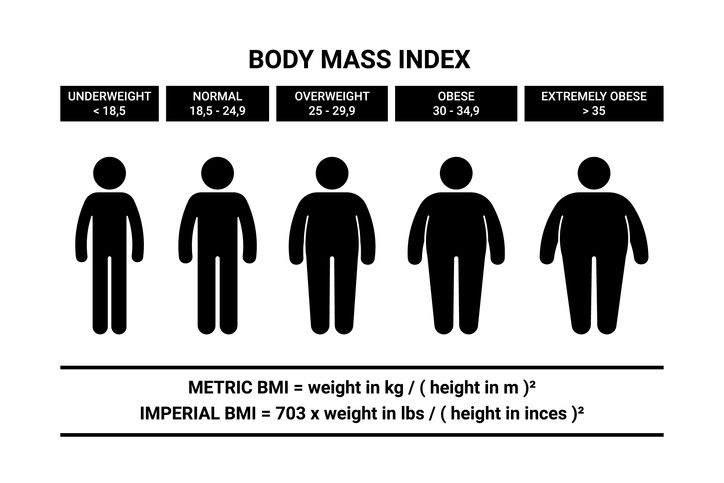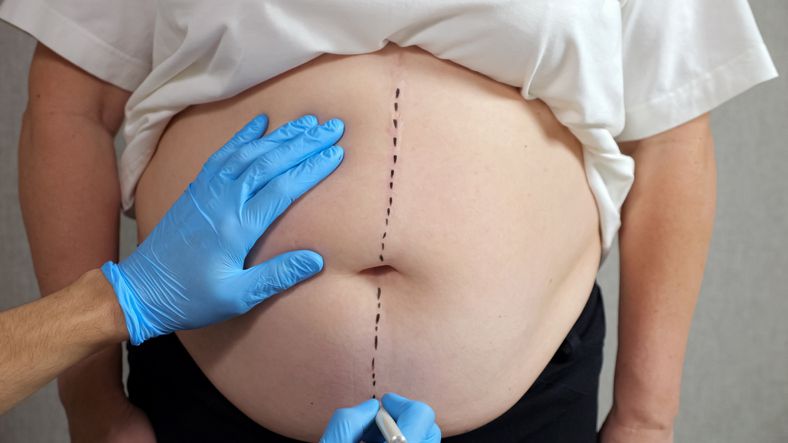

Book Now to Experience
S6 Body Sculpting Treatment
1 Minute Self-Registration
Date should not be before minimal date
Author: Leila Tan|Updated: 23 July 2024
If you are obese and considering a weight loss programme, you may be thinking about the before and after effects on your body and health. You probably already know there are numerous benefits to transforming from an obese person into a healthy one, but you also know it can be challenging and carry risks. Worry not, we'll talk about some of the most common ways that losing weight can affect your physical and mental health, as well as what to do about them.

1
How Can One Determine Obesity?

Body mass index (BMI), which is the ratio of a person's weight to their height, is one way to determine whether a person is obese. If your BMI exceeds 30, you are considered obese. To determine if you are obese, you can also measure your girth, which indicates how much abdominal fat you have. Men whose waist circumference exceeds 40 inches and women whose waist circumference exceeds 35 inches are rotund. However, these numbers do not always apply to everyone, especially those with a variety of body types or who are exceptionally muscular.
Causes Behind Obesity
* Genetic factors: Some people's appetites, metabolic rates, and the locations of fat stores in their bodies may be determined by their genetic makeup. They might put on weight more easily and have a harder time losing it because of these genes. Some people, for example, may have a variant of the FTO gene that causes them to experience changes in satiety more frequently.
* Environmental factors: A person's size may also be influenced by their immediate environment. Lack of access to healthy food, safe locations to be physically active, and quality health care, for example, has been linked to an increased risk of obesity. Furthermore, being exposed to chemicals such as endocrine disruptors can interfere with the body's natural hormones that regulate metabolism and appetite.
* Behavioural factors: The choices and routines people engage in can also have an impact on their body mass index and energy balance. Some people who suffer from binge eating disorder may also have a propensity towards consuming a high-calorie diet that is rich in processed foods, sugary drinks, and alcohol. Similarly, a lack of exercise and excessive screen time might decrease your metabolic rate, leading to weight gain.
* Metabolism factors: Some health conditions and medications might alter metabolism and contribute to weight gain. Hormonal imbalances caused by conditions such as hypothyroidism, Cushing's syndrome, polycystic ovarian syndrome (PCOS), and even depression can cause an individual to consume more calories than they burn or vice versa. Weight gain is another side effect of many medications, including steroids, antipsychotics, antidepressants, and anticonvulsants. There are several ways in which obesity is detrimental to health and well-being. Long-term effects include an increased risk of developing conditions such as type 2 diabetes, cardiovascular disease, stroke, some malignancies, gout, and sleep apnea. Mental health issues like low self-esteem, melancholy, worry, and a generalised feeling of being judged by others can also be a result. Obesity can be prevented and treated effectively with a healthy lifestyle that emphasises a balanced diet and regular physical activity.


2
Why You Should Pound Weight Loss And Get Rid of Obesity

When you lose weight, the amount of fat and muscle in your body goes down. This can be good for your health in many ways, such as:
* Lowering your blood pressure and cholesterol numbers can make you less likely to get heart disease or a stroke.
* Better control of blood sugar, which can help people avoid or deal with diabetes and its problems.
* Less pain and swelling in your joints, which can make you more mobile and improve your quality of life.
* Better oxygen supply and breathing, which can help prevent or treat sleep apnea and other breathing problems.
* More energy and strength, which can help you work, study, or play sports better.
Losing weight can also make you feel proud of what you've done and more comfortable in your own skin, which can improve your self-esteem and confidence. You might also like buying new clothes, trying new things, or hearing nice things from other people.
Read More

3
Changing Eating Habits And Practising Healthy Lifestyle Don't Work...What Should I Do?

Obesity can't be cured all at once, but there are ways to deal with it and improve health and quality of life. The main goal of treating obesity is to lost weight and keep it off. This can be done by changing the way you eat and how much you work out, but for those that need a quicker weight loss progress due to their current appetite or body shape, they will need to combine other methods to pound weight loss and prevent themselves from gaining weight, such as bariatric surgeries.
Bariatric surgeries are another name for operations that help people to achieve weight loss. They are treatments that help people lose weight and lower their risk of getting health problems like diabetes, heart disease, and sleep apnea that are linked to being overweight. Bariatric treatments work by limiting how much food the stomach can hold or by making it harder for the body to absorb nutrients from food. Gastric sleeve surgery, gastric band surgery, duodenal switch surgery and gastric bypass surgery are all popular types of weight loss surgery. Each type has its own pros and cons and should only be done after careful thought and talking to a doctor.
Typically, these procedures are performed when diet and exercise have failed or when obesity poses grave health risks. However, not everyone is suitable for bariatric surgery. The following are examples of eligibility criteria for bariatric surgery:
* Possessing a body mass index (BMI) of 40 or higher, or a BMI of 35 or higher with at least one obesity-related condition, such as type 2 diabetes, elevated blood pressure, sleep apnea, or cardiovascular disease.
* Being committed to altering one's lifestyle after surgery, including adopting a healthy diet, engaging in regular exercise, taking vitamins and supplements, and attending follow-up appointments.
* Having no medical conditions that would make surgery unsafe or ineffective, such as severe liver disease, active substance misuse, uncontrolled mental illness, or blood clotting disorders.
* Being well-informed about the benefits and risks of bariatric surgery, and having realistic expectations regarding the outcomes and potential complications.
Bariatric surgery is not a fast solution to obesity. They must make permanent dietary and physical activity modifications to maintain their weight loss and health. Therefore, anyone contemplating bariatric surgery should consult with their physician and a bariatric team to determine if they are suitable candidates and which form of surgery would be most beneficial.


4
Weight Loss Before and After: Should You Have Surgery or Treatment?

If you want to lose weight and improve your health, you may be thinking if surgery or treatment is the way to go. Both choices have pros and cons, and the best one for you relies on your own goals and situation. Here are some things to think about before you decide.
Surgery is more dangerous and invasive, but it can also give better and longer-lasting effects. Gastric bypass, gastric sleeve, and lap band are all types of weight loss surgery. These treatments make your stomach smaller or change how your body absorbs food, which makes you feel full faster and eat less.
Within a year, surgery can help you lose up to 80% of your extra weight and lower your risk of diabetes, heart disease, and other health problems linked to obesity.
However, surgery has some bad sides as well. It costs a lot, and your insurance may not cover it. After the surgery, you will need a long time to heal and a strict diet. You may have side effects like feeling sick, throwing up, having diarrhoea, or dumping syndrome. You may also need to take pills for the rest of your life to make sure you get all the nutrients you need. Surgery is not a magic bullet; you still have to live a healthy life to keep the weight off and avoid problems.
Treatment is safer and less invasive, but the effects may be less dramatic and take longer to show. Medication, counselling, diet plans, exercise plans, or gadgets that help you control your appetite or digestion can all be used as part of treatment. Well-known treatments on the market include S6 Body Sculpting, CoolSculpting and more. You can lose up to 10% of your body weight and improve your blood pressure, cholesterol, and blood sugar levels by using these ways.
In the end, your current weight, health, goals, preferences, and budget will determine which choice is best for you. Before you decide on surgery or treatment, you should talk to your doctor and a chef. They can help you think about the pros and cons of each choice and suggest the best one for you. Remember that losing weight is a process that takes time, effort, and help. No matter which choice you choose, you should be proud of yourself for taking steps to improve your health and well-being.

Book Now to Experience
S6 Body Sculpting Treatment
1 Minute Self-Registration
Date should not be before minimal date

5
Pick The Right Lost Weight Method to Avoid Gaining Weight: What Happens If You Do it Wrong

There are many good things about losing weight, but there can also be some repercussions if you try to lose a few pounds the wrong way. Some of the most common things that happen to your body and mind when you lose weight are:
* Loose skin and stretch lines, which can happen when you lose a lot of weight quickly or if your skin doesn't stretch well. This can make you look bad and hurt your self-esteem. It can also make you feel bad or give you an illness.
* Hair loss and weak nails, which can be caused by not getting enough nutrients, changes in hormones, or stress from losing weight. This can make you less beautiful and lower your self-esteem.
* Loss of muscle and a slower metabolism, which can happen if you lose weight too fast or eat too few calories. This could make it harder for you to keep the weight off or lose more in the future.
* Swings in mood and depression, which can be caused by changes in hormones, being alone, or having unrealistic hopes about weight loss. This can hurt your mental health and well-being, as well as the way you get along with other people.


6
Weight Loss Before and After Multiple Solutions Used: Things to Do on Your Weight Loss Journeys

Weight loss is a complicated and personal process that can affect your body and mind in both good and bad ways, and some may even last for your entire life. Here are some ways to deal with the changes that come with losing weight.
* Make goals for yourself that are realistic and good for you and celebrate your growth along the way. Don't judge yourself by how others look or by ideals of beauty that aren't real.
* Always plan to have well-balanced, healthy meals that fits your wants, and you must stay away from all the fat food or fast food. Avoid diets that are too hard to follow or have too few calories. Eat foods from all the food groups and don't be afraid to treat yourself once in a while.
* A healthier lifestyle matters the most if you wish to be the protagonist of another weight loss success story. Do regular physical activities that fit your level of fitness and your hobbies. Exercise can help you burn calories, build strength, feel better, and keep you from gaining back weight. Find things you like to do that work with your plan.
* Surround yourself with people who will help you and accept the choices you make. Stay away from people who pick on your looks or try to stop you from reaching your goals. Join a support group for people who want to lose weight or a community online where you can share your stories and learn from others.

7
Conclusion

Before and after weight loss can be a rewarding but difficult process that changes many parts of your life. By knowing what you lose and what you gain when you lose weight and by using some coping skills, you can make the most of your change and live a healthier, happy life!
FAQ
1.How does gastric bypass surgery function and what is it?
Gastric bypass surgery is a type of weight reduction surgery involving the creation of a small pouch from the stomach and its direct connection to the small intestine. After gastric bypass surgery, food will enter this tiny stomach pouch and then enter the small intestine directly, bypassing the majority of the stomach and the beginning of the small intestine. This decreases the quantity of food you can consume and the number of calories you absorb. Surgical gastric bypass can help individuals with extreme obesity lose weight and improve their health. However, there are risks and complications associated with the procedure, including infection, haemorrhage, leakage, malnutrition, dumping syndrome, ulcers, gallstones, and hernia. Therefore, gastric bypass surgery should only be considered as a last resort after other weight loss methods have been exhausted and under the supervision of a physician.
2.What is obesity and what health hazards does it pose?
Obesity is a condition characterised by excessive body fat that can be detrimental to a person's health. Obesity increases the risk of numerous diseases and health conditions, including type 2 diabetes, heart disease, stroke, high blood pressure, certain malignancies, sleep apnea, osteoarthritis, and gallbladder disease.
3.What are some examples of healthy weight management meals?
Examples of healthy weight control meals include oatmeal with fresh fruits and nuts for breakfast. Choose meals are abundant in protein, fibre, vitamins, minerals, and antioxidants, allowing you to feel satiated and nourished.
4.How intermittent fasting helps obese people to achieve impressive weight loss?
Intermittent fasting is a popular method of weight loss that involves alternating periods of eating and fasting. It can help obese people lose weight by reducing their calorie intake and improving their metabolic health. However, intermittent fasting is not suitable for everyone and may have some side effects. Here are some frequently asked questions about weight loss and intermittent fasting for obese people.
5.Why are healthy meals important for obese people?
Healthy meals are important for obese people because they can help them lose weight, lower their risk of chronic diseases, and improve their overall health and well-being.

Book Now to Experience
S6 Body Sculpting Treatment
1 Minute Self-Registration
Date should not be before minimal date
Recommended Articles
COPYRIGHT© NEW BEAUTY MANAGEMENT LIMITED 2025. ALL RIGHT RESERVED.




